Bariatric Surgery: Exploring Physiological Effects and Risks
VerifiedAdded on 2023/04/08
|7
|1532
|257
Essay
AI Summary
This essay provides a detailed overview of bariatric surgery, a common method for reducing obesity, while also addressing its various short-term and long-term side effects. Short-term effects discussed include nausea, vomiting, and pain, while long-term effects range from hernias to reduced pulmonary functioning. The essay also explores the changes in gastrointestinal hormones, such as ghrelin, GLP, and PYY, and their impact on appetite and energy balance. Furthermore, it highlights the potential risks associated with bariatric surgery, including increased risk of pulmonary and heart diseases, and concludes that while bariatric surgery can be a useful method for reducing body fat in obese individuals, a thorough understanding of its effects and risks is crucial for effective management and positive outcomes. Desklib offers similar solved assignments.

Running head: BARIATRIC SURGERY
Topic: BARIATRIC SURGERY
Name of the Student:
Name of the University:
Author’s Note:
Topic: BARIATRIC SURGERY
Name of the Student:
Name of the University:
Author’s Note:
Paraphrase This Document
Need a fresh take? Get an instant paraphrase of this document with our AI Paraphraser
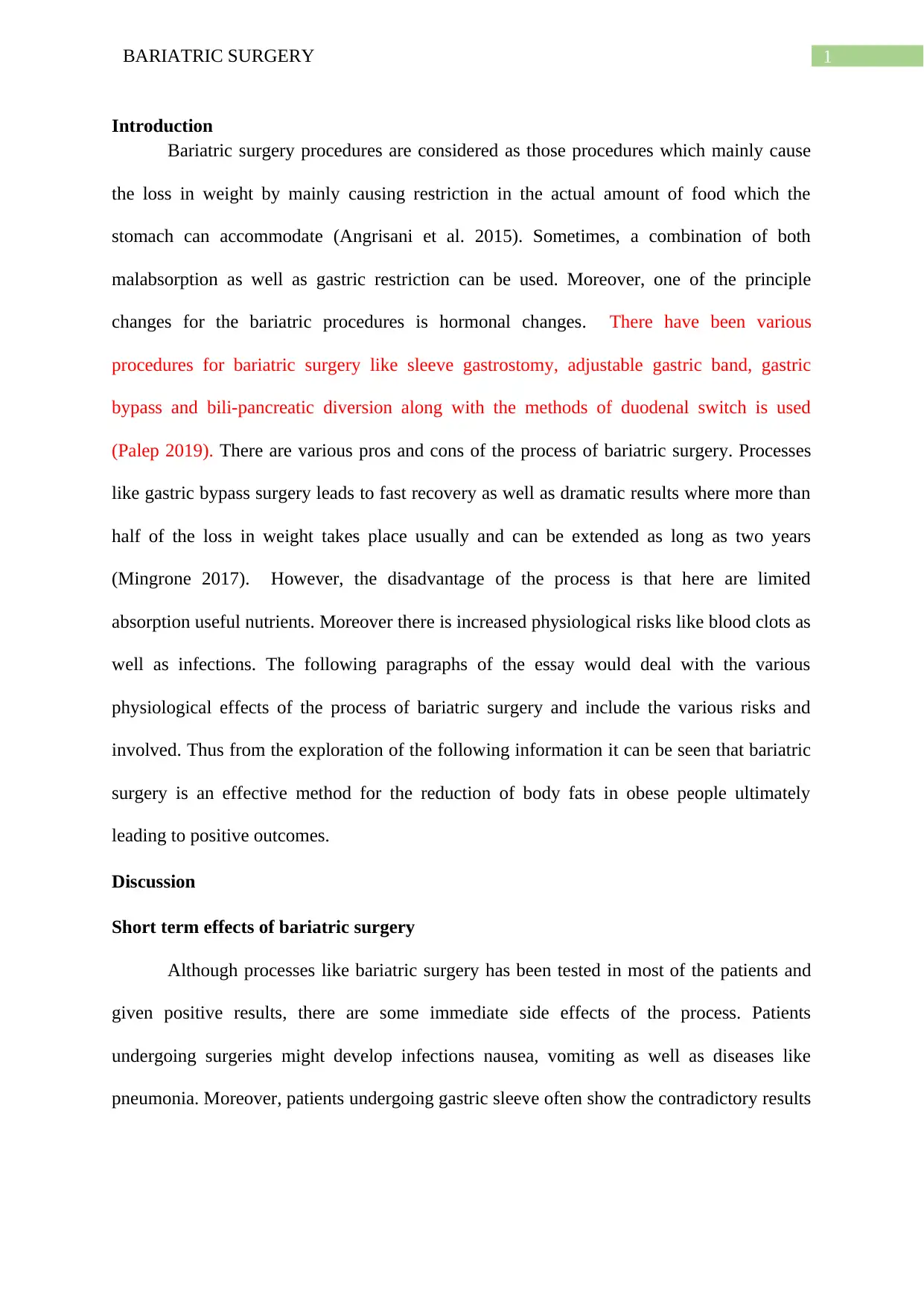
1BARIATRIC SURGERY
Introduction
Bariatric surgery procedures are considered as those procedures which mainly cause
the loss in weight by mainly causing restriction in the actual amount of food which the
stomach can accommodate (Angrisani et al. 2015). Sometimes, a combination of both
malabsorption as well as gastric restriction can be used. Moreover, one of the principle
changes for the bariatric procedures is hormonal changes. There have been various
procedures for bariatric surgery like sleeve gastrostomy, adjustable gastric band, gastric
bypass and bili-pancreatic diversion along with the methods of duodenal switch is used
(Palep 2019). There are various pros and cons of the process of bariatric surgery. Processes
like gastric bypass surgery leads to fast recovery as well as dramatic results where more than
half of the loss in weight takes place usually and can be extended as long as two years
(Mingrone 2017). However, the disadvantage of the process is that here are limited
absorption useful nutrients. Moreover there is increased physiological risks like blood clots as
well as infections. The following paragraphs of the essay would deal with the various
physiological effects of the process of bariatric surgery and include the various risks and
involved. Thus from the exploration of the following information it can be seen that bariatric
surgery is an effective method for the reduction of body fats in obese people ultimately
leading to positive outcomes.
Discussion
Short term effects of bariatric surgery
Although processes like bariatric surgery has been tested in most of the patients and
given positive results, there are some immediate side effects of the process. Patients
undergoing surgeries might develop infections nausea, vomiting as well as diseases like
pneumonia. Moreover, patients undergoing gastric sleeve often show the contradictory results
Introduction
Bariatric surgery procedures are considered as those procedures which mainly cause
the loss in weight by mainly causing restriction in the actual amount of food which the
stomach can accommodate (Angrisani et al. 2015). Sometimes, a combination of both
malabsorption as well as gastric restriction can be used. Moreover, one of the principle
changes for the bariatric procedures is hormonal changes. There have been various
procedures for bariatric surgery like sleeve gastrostomy, adjustable gastric band, gastric
bypass and bili-pancreatic diversion along with the methods of duodenal switch is used
(Palep 2019). There are various pros and cons of the process of bariatric surgery. Processes
like gastric bypass surgery leads to fast recovery as well as dramatic results where more than
half of the loss in weight takes place usually and can be extended as long as two years
(Mingrone 2017). However, the disadvantage of the process is that here are limited
absorption useful nutrients. Moreover there is increased physiological risks like blood clots as
well as infections. The following paragraphs of the essay would deal with the various
physiological effects of the process of bariatric surgery and include the various risks and
involved. Thus from the exploration of the following information it can be seen that bariatric
surgery is an effective method for the reduction of body fats in obese people ultimately
leading to positive outcomes.
Discussion
Short term effects of bariatric surgery
Although processes like bariatric surgery has been tested in most of the patients and
given positive results, there are some immediate side effects of the process. Patients
undergoing surgeries might develop infections nausea, vomiting as well as diseases like
pneumonia. Moreover, patients undergoing gastric sleeve often show the contradictory results
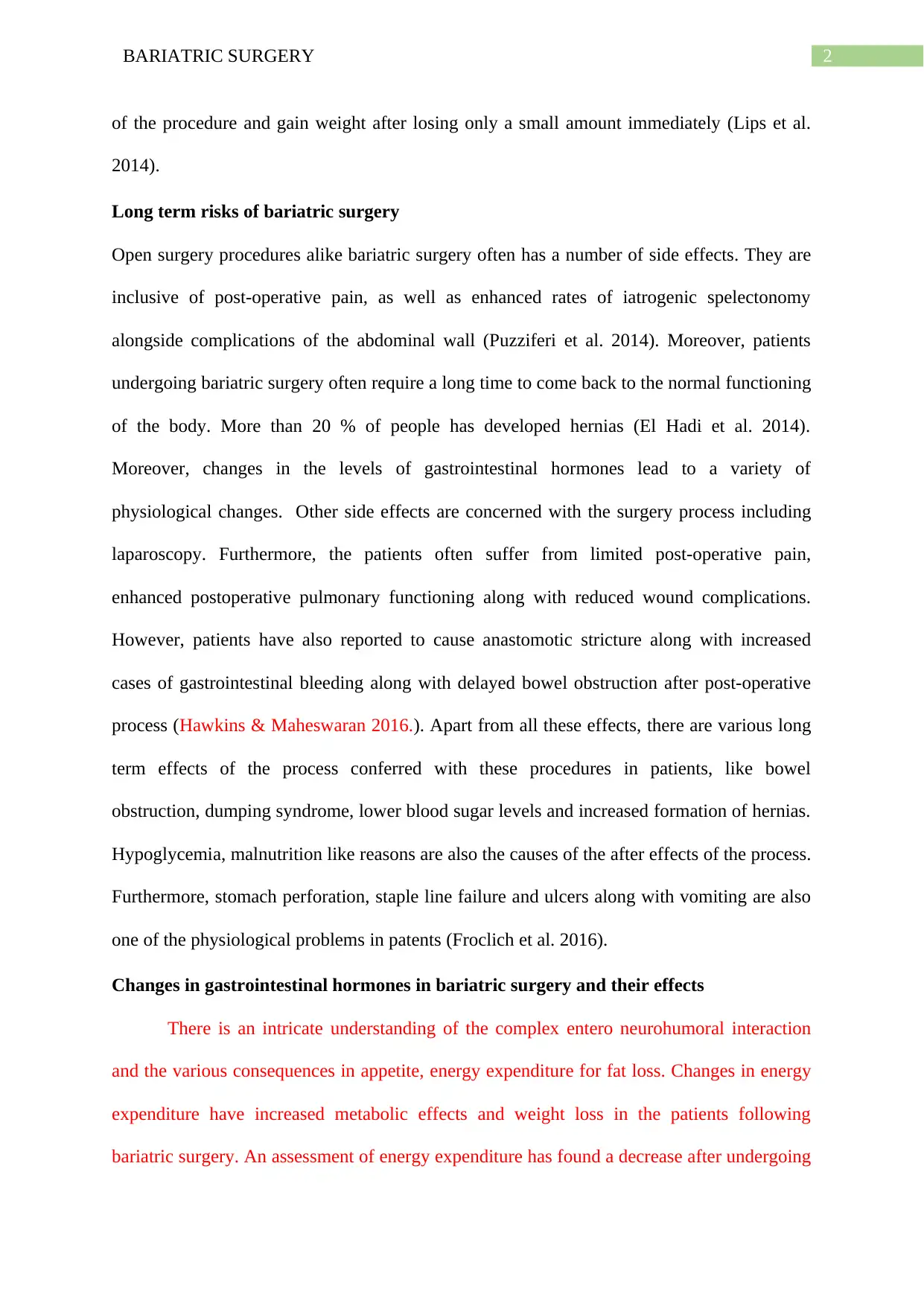
2BARIATRIC SURGERY
of the procedure and gain weight after losing only a small amount immediately (Lips et al.
2014).
Long term risks of bariatric surgery
Open surgery procedures alike bariatric surgery often has a number of side effects. They are
inclusive of post-operative pain, as well as enhanced rates of iatrogenic spelectonomy
alongside complications of the abdominal wall (Puzziferi et al. 2014). Moreover, patients
undergoing bariatric surgery often require a long time to come back to the normal functioning
of the body. More than 20 % of people has developed hernias (El Hadi et al. 2014).
Moreover, changes in the levels of gastrointestinal hormones lead to a variety of
physiological changes. Other side effects are concerned with the surgery process including
laparoscopy. Furthermore, the patients often suffer from limited post-operative pain,
enhanced postoperative pulmonary functioning along with reduced wound complications.
However, patients have also reported to cause anastomotic stricture along with increased
cases of gastrointestinal bleeding along with delayed bowel obstruction after post-operative
process (Hawkins & Maheswaran 2016.). Apart from all these effects, there are various long
term effects of the process conferred with these procedures in patients, like bowel
obstruction, dumping syndrome, lower blood sugar levels and increased formation of hernias.
Hypoglycemia, malnutrition like reasons are also the causes of the after effects of the process.
Furthermore, stomach perforation, staple line failure and ulcers along with vomiting are also
one of the physiological problems in patents (Froclich et al. 2016).
Changes in gastrointestinal hormones in bariatric surgery and their effects
There is an intricate understanding of the complex entero neurohumoral interaction
and the various consequences in appetite, energy expenditure for fat loss. Changes in energy
expenditure have increased metabolic effects and weight loss in the patients following
bariatric surgery. An assessment of energy expenditure has found a decrease after undergoing
of the procedure and gain weight after losing only a small amount immediately (Lips et al.
2014).
Long term risks of bariatric surgery
Open surgery procedures alike bariatric surgery often has a number of side effects. They are
inclusive of post-operative pain, as well as enhanced rates of iatrogenic spelectonomy
alongside complications of the abdominal wall (Puzziferi et al. 2014). Moreover, patients
undergoing bariatric surgery often require a long time to come back to the normal functioning
of the body. More than 20 % of people has developed hernias (El Hadi et al. 2014).
Moreover, changes in the levels of gastrointestinal hormones lead to a variety of
physiological changes. Other side effects are concerned with the surgery process including
laparoscopy. Furthermore, the patients often suffer from limited post-operative pain,
enhanced postoperative pulmonary functioning along with reduced wound complications.
However, patients have also reported to cause anastomotic stricture along with increased
cases of gastrointestinal bleeding along with delayed bowel obstruction after post-operative
process (Hawkins & Maheswaran 2016.). Apart from all these effects, there are various long
term effects of the process conferred with these procedures in patients, like bowel
obstruction, dumping syndrome, lower blood sugar levels and increased formation of hernias.
Hypoglycemia, malnutrition like reasons are also the causes of the after effects of the process.
Furthermore, stomach perforation, staple line failure and ulcers along with vomiting are also
one of the physiological problems in patents (Froclich et al. 2016).
Changes in gastrointestinal hormones in bariatric surgery and their effects
There is an intricate understanding of the complex entero neurohumoral interaction
and the various consequences in appetite, energy expenditure for fat loss. Changes in energy
expenditure have increased metabolic effects and weight loss in the patients following
bariatric surgery. An assessment of energy expenditure has found a decrease after undergoing
⊘ This is a preview!⊘
Do you want full access?
Subscribe today to unlock all pages.

Trusted by 1+ million students worldwide
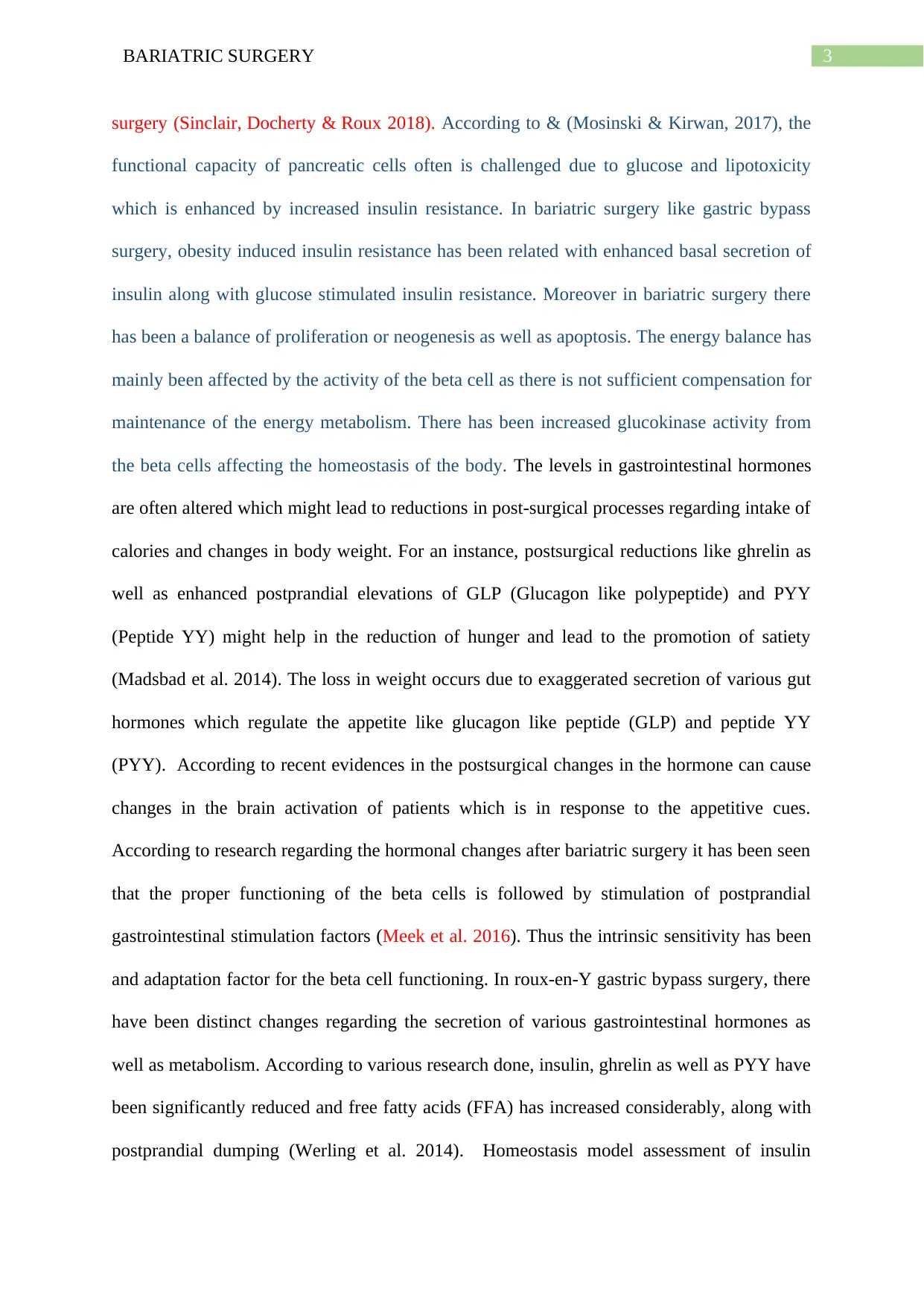
3BARIATRIC SURGERY
surgery (Sinclair, Docherty & Roux 2018). According to & (Mosinski & Kirwan, 2017), the
functional capacity of pancreatic cells often is challenged due to glucose and lipotoxicity
which is enhanced by increased insulin resistance. In bariatric surgery like gastric bypass
surgery, obesity induced insulin resistance has been related with enhanced basal secretion of
insulin along with glucose stimulated insulin resistance. Moreover in bariatric surgery there
has been a balance of proliferation or neogenesis as well as apoptosis. The energy balance has
mainly been affected by the activity of the beta cell as there is not sufficient compensation for
maintenance of the energy metabolism. There has been increased glucokinase activity from
the beta cells affecting the homeostasis of the body. The levels in gastrointestinal hormones
are often altered which might lead to reductions in post-surgical processes regarding intake of
calories and changes in body weight. For an instance, postsurgical reductions like ghrelin as
well as enhanced postprandial elevations of GLP (Glucagon like polypeptide) and PYY
(Peptide YY) might help in the reduction of hunger and lead to the promotion of satiety
(Madsbad et al. 2014). The loss in weight occurs due to exaggerated secretion of various gut
hormones which regulate the appetite like glucagon like peptide (GLP) and peptide YY
(PYY). According to recent evidences in the postsurgical changes in the hormone can cause
changes in the brain activation of patients which is in response to the appetitive cues.
According to research regarding the hormonal changes after bariatric surgery it has been seen
that the proper functioning of the beta cells is followed by stimulation of postprandial
gastrointestinal stimulation factors (Meek et al. 2016). Thus the intrinsic sensitivity has been
and adaptation factor for the beta cell functioning. In roux-en-Y gastric bypass surgery, there
have been distinct changes regarding the secretion of various gastrointestinal hormones as
well as metabolism. According to various research done, insulin, ghrelin as well as PYY have
been significantly reduced and free fatty acids (FFA) has increased considerably, along with
postprandial dumping (Werling et al. 2014). Homeostasis model assessment of insulin
surgery (Sinclair, Docherty & Roux 2018). According to & (Mosinski & Kirwan, 2017), the
functional capacity of pancreatic cells often is challenged due to glucose and lipotoxicity
which is enhanced by increased insulin resistance. In bariatric surgery like gastric bypass
surgery, obesity induced insulin resistance has been related with enhanced basal secretion of
insulin along with glucose stimulated insulin resistance. Moreover in bariatric surgery there
has been a balance of proliferation or neogenesis as well as apoptosis. The energy balance has
mainly been affected by the activity of the beta cell as there is not sufficient compensation for
maintenance of the energy metabolism. There has been increased glucokinase activity from
the beta cells affecting the homeostasis of the body. The levels in gastrointestinal hormones
are often altered which might lead to reductions in post-surgical processes regarding intake of
calories and changes in body weight. For an instance, postsurgical reductions like ghrelin as
well as enhanced postprandial elevations of GLP (Glucagon like polypeptide) and PYY
(Peptide YY) might help in the reduction of hunger and lead to the promotion of satiety
(Madsbad et al. 2014). The loss in weight occurs due to exaggerated secretion of various gut
hormones which regulate the appetite like glucagon like peptide (GLP) and peptide YY
(PYY). According to recent evidences in the postsurgical changes in the hormone can cause
changes in the brain activation of patients which is in response to the appetitive cues.
According to research regarding the hormonal changes after bariatric surgery it has been seen
that the proper functioning of the beta cells is followed by stimulation of postprandial
gastrointestinal stimulation factors (Meek et al. 2016). Thus the intrinsic sensitivity has been
and adaptation factor for the beta cell functioning. In roux-en-Y gastric bypass surgery, there
have been distinct changes regarding the secretion of various gastrointestinal hormones as
well as metabolism. According to various research done, insulin, ghrelin as well as PYY have
been significantly reduced and free fatty acids (FFA) has increased considerably, along with
postprandial dumping (Werling et al. 2014). Homeostasis model assessment of insulin
Paraphrase This Document
Need a fresh take? Get an instant paraphrase of this document with our AI Paraphraser
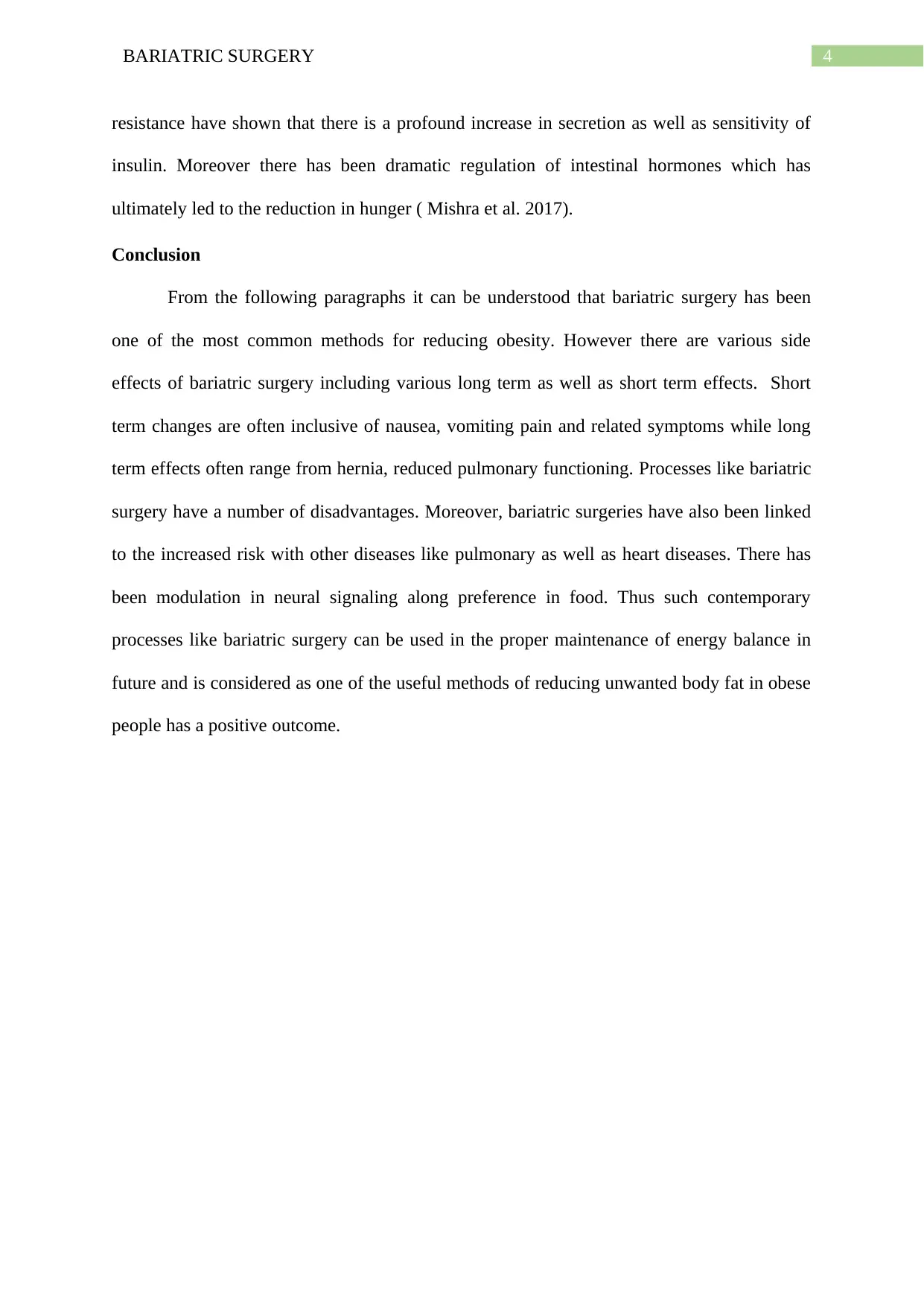
4BARIATRIC SURGERY
resistance have shown that there is a profound increase in secretion as well as sensitivity of
insulin. Moreover there has been dramatic regulation of intestinal hormones which has
ultimately led to the reduction in hunger ( Mishra et al. 2017).
Conclusion
From the following paragraphs it can be understood that bariatric surgery has been
one of the most common methods for reducing obesity. However there are various side
effects of bariatric surgery including various long term as well as short term effects. Short
term changes are often inclusive of nausea, vomiting pain and related symptoms while long
term effects often range from hernia, reduced pulmonary functioning. Processes like bariatric
surgery have a number of disadvantages. Moreover, bariatric surgeries have also been linked
to the increased risk with other diseases like pulmonary as well as heart diseases. There has
been modulation in neural signaling along preference in food. Thus such contemporary
processes like bariatric surgery can be used in the proper maintenance of energy balance in
future and is considered as one of the useful methods of reducing unwanted body fat in obese
people has a positive outcome.
resistance have shown that there is a profound increase in secretion as well as sensitivity of
insulin. Moreover there has been dramatic regulation of intestinal hormones which has
ultimately led to the reduction in hunger ( Mishra et al. 2017).
Conclusion
From the following paragraphs it can be understood that bariatric surgery has been
one of the most common methods for reducing obesity. However there are various side
effects of bariatric surgery including various long term as well as short term effects. Short
term changes are often inclusive of nausea, vomiting pain and related symptoms while long
term effects often range from hernia, reduced pulmonary functioning. Processes like bariatric
surgery have a number of disadvantages. Moreover, bariatric surgeries have also been linked
to the increased risk with other diseases like pulmonary as well as heart diseases. There has
been modulation in neural signaling along preference in food. Thus such contemporary
processes like bariatric surgery can be used in the proper maintenance of energy balance in
future and is considered as one of the useful methods of reducing unwanted body fat in obese
people has a positive outcome.
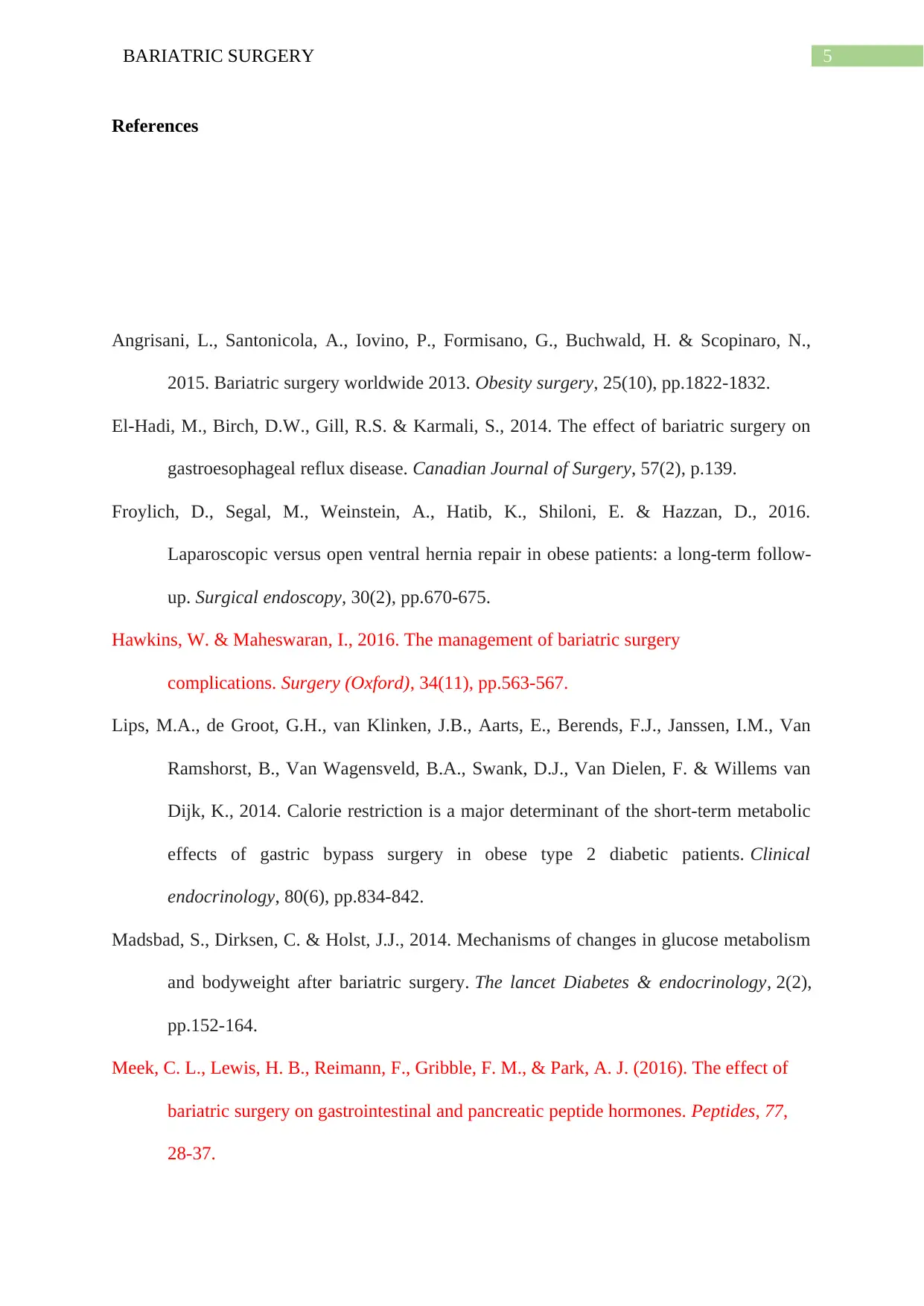
5BARIATRIC SURGERY
References
Angrisani, L., Santonicola, A., Iovino, P., Formisano, G., Buchwald, H. & Scopinaro, N.,
2015. Bariatric surgery worldwide 2013. Obesity surgery, 25(10), pp.1822-1832.
El-Hadi, M., Birch, D.W., Gill, R.S. & Karmali, S., 2014. The effect of bariatric surgery on
gastroesophageal reflux disease. Canadian Journal of Surgery, 57(2), p.139.
Froylich, D., Segal, M., Weinstein, A., Hatib, K., Shiloni, E. & Hazzan, D., 2016.
Laparoscopic versus open ventral hernia repair in obese patients: a long-term follow-
up. Surgical endoscopy, 30(2), pp.670-675.
Hawkins, W. & Maheswaran, I., 2016. The management of bariatric surgery
complications. Surgery (Oxford), 34(11), pp.563-567.
Lips, M.A., de Groot, G.H., van Klinken, J.B., Aarts, E., Berends, F.J., Janssen, I.M., Van
Ramshorst, B., Van Wagensveld, B.A., Swank, D.J., Van Dielen, F. & Willems van
Dijk, K., 2014. Calorie restriction is a major determinant of the short‐term metabolic
effects of gastric bypass surgery in obese type 2 diabetic patients. Clinical
endocrinology, 80(6), pp.834-842.
Madsbad, S., Dirksen, C. & Holst, J.J., 2014. Mechanisms of changes in glucose metabolism
and bodyweight after bariatric surgery. The lancet Diabetes & endocrinology, 2(2),
pp.152-164.
Meek, C. L., Lewis, H. B., Reimann, F., Gribble, F. M., & Park, A. J. (2016). The effect of
bariatric surgery on gastrointestinal and pancreatic peptide hormones. Peptides, 77,
28-37.
References
Angrisani, L., Santonicola, A., Iovino, P., Formisano, G., Buchwald, H. & Scopinaro, N.,
2015. Bariatric surgery worldwide 2013. Obesity surgery, 25(10), pp.1822-1832.
El-Hadi, M., Birch, D.W., Gill, R.S. & Karmali, S., 2014. The effect of bariatric surgery on
gastroesophageal reflux disease. Canadian Journal of Surgery, 57(2), p.139.
Froylich, D., Segal, M., Weinstein, A., Hatib, K., Shiloni, E. & Hazzan, D., 2016.
Laparoscopic versus open ventral hernia repair in obese patients: a long-term follow-
up. Surgical endoscopy, 30(2), pp.670-675.
Hawkins, W. & Maheswaran, I., 2016. The management of bariatric surgery
complications. Surgery (Oxford), 34(11), pp.563-567.
Lips, M.A., de Groot, G.H., van Klinken, J.B., Aarts, E., Berends, F.J., Janssen, I.M., Van
Ramshorst, B., Van Wagensveld, B.A., Swank, D.J., Van Dielen, F. & Willems van
Dijk, K., 2014. Calorie restriction is a major determinant of the short‐term metabolic
effects of gastric bypass surgery in obese type 2 diabetic patients. Clinical
endocrinology, 80(6), pp.834-842.
Madsbad, S., Dirksen, C. & Holst, J.J., 2014. Mechanisms of changes in glucose metabolism
and bodyweight after bariatric surgery. The lancet Diabetes & endocrinology, 2(2),
pp.152-164.
Meek, C. L., Lewis, H. B., Reimann, F., Gribble, F. M., & Park, A. J. (2016). The effect of
bariatric surgery on gastrointestinal and pancreatic peptide hormones. Peptides, 77,
28-37.
⊘ This is a preview!⊘
Do you want full access?
Subscribe today to unlock all pages.

Trusted by 1+ million students worldwide
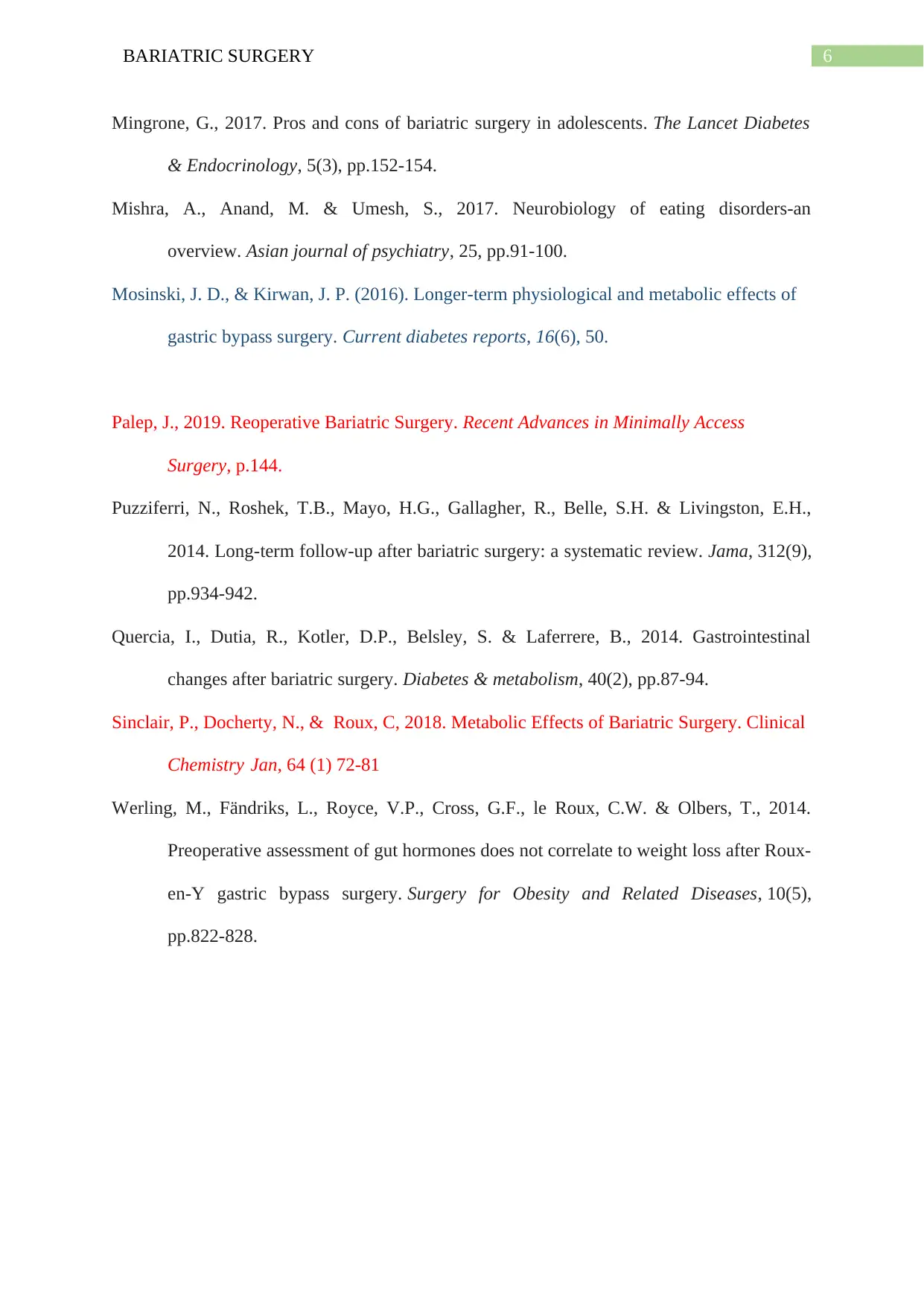
6BARIATRIC SURGERY
Mingrone, G., 2017. Pros and cons of bariatric surgery in adolescents. The Lancet Diabetes
& Endocrinology, 5(3), pp.152-154.
Mishra, A., Anand, M. & Umesh, S., 2017. Neurobiology of eating disorders-an
overview. Asian journal of psychiatry, 25, pp.91-100.
Mosinski, J. D., & Kirwan, J. P. (2016). Longer-term physiological and metabolic effects of
gastric bypass surgery. Current diabetes reports, 16(6), 50.
Palep, J., 2019. Reoperative Bariatric Surgery. Recent Advances in Minimally Access
Surgery, p.144.
Puzziferri, N., Roshek, T.B., Mayo, H.G., Gallagher, R., Belle, S.H. & Livingston, E.H.,
2014. Long-term follow-up after bariatric surgery: a systematic review. Jama, 312(9),
pp.934-942.
Quercia, I., Dutia, R., Kotler, D.P., Belsley, S. & Laferrere, B., 2014. Gastrointestinal
changes after bariatric surgery. Diabetes & metabolism, 40(2), pp.87-94.
Sinclair, P., Docherty, N., & Roux, C, 2018. Metabolic Effects of Bariatric Surgery. Clinical
Chemistry Jan, 64 (1) 72-81
Werling, M., Fändriks, L., Royce, V.P., Cross, G.F., le Roux, C.W. & Olbers, T., 2014.
Preoperative assessment of gut hormones does not correlate to weight loss after Roux-
en-Y gastric bypass surgery. Surgery for Obesity and Related Diseases, 10(5),
pp.822-828.
Mingrone, G., 2017. Pros and cons of bariatric surgery in adolescents. The Lancet Diabetes
& Endocrinology, 5(3), pp.152-154.
Mishra, A., Anand, M. & Umesh, S., 2017. Neurobiology of eating disorders-an
overview. Asian journal of psychiatry, 25, pp.91-100.
Mosinski, J. D., & Kirwan, J. P. (2016). Longer-term physiological and metabolic effects of
gastric bypass surgery. Current diabetes reports, 16(6), 50.
Palep, J., 2019. Reoperative Bariatric Surgery. Recent Advances in Minimally Access
Surgery, p.144.
Puzziferri, N., Roshek, T.B., Mayo, H.G., Gallagher, R., Belle, S.H. & Livingston, E.H.,
2014. Long-term follow-up after bariatric surgery: a systematic review. Jama, 312(9),
pp.934-942.
Quercia, I., Dutia, R., Kotler, D.P., Belsley, S. & Laferrere, B., 2014. Gastrointestinal
changes after bariatric surgery. Diabetes & metabolism, 40(2), pp.87-94.
Sinclair, P., Docherty, N., & Roux, C, 2018. Metabolic Effects of Bariatric Surgery. Clinical
Chemistry Jan, 64 (1) 72-81
Werling, M., Fändriks, L., Royce, V.P., Cross, G.F., le Roux, C.W. & Olbers, T., 2014.
Preoperative assessment of gut hormones does not correlate to weight loss after Roux-
en-Y gastric bypass surgery. Surgery for Obesity and Related Diseases, 10(5),
pp.822-828.
1 out of 7
Related Documents
Your All-in-One AI-Powered Toolkit for Academic Success.
+13062052269
info@desklib.com
Available 24*7 on WhatsApp / Email
![[object Object]](/_next/static/media/star-bottom.7253800d.svg)
Unlock your academic potential
Copyright © 2020–2025 A2Z Services. All Rights Reserved. Developed and managed by ZUCOL.





